Tips for Water Intake For Aging Adults
Water is often called the essence of life, and for good reason. It plays a crucial role in every cell, tissue, and organ of our body.
As we age, the importance of maintaining proper hydration only amplifies.
The unique hydration needs of aging adults are often different than those of younger individuals, demanding a nuanced approach to ensure optimal health and wellbeing.
Why Do Seniors Need Proper Hydration?
As aging adults step into their golden years, their bodies undergo various changes, influencing the way they process and use water. Let's delve deeper into why water intake remains paramount for seniors:
-
Role of water in bodily functions: Water isn't just about quenching thirst. It aids in digestion, facilitates nutrient absorption, lubricates joints, helps in detoxifying the body, and is crucial for proper brain function. For seniors, these processes can be hampered if they don’t receive an adequate amount of water.
-
The impact of dehydration on health: Dehydration isn’t just about feeling thirsty. For the elderly, the repercussions can be grave.
- Urinary tract infections: Dehydration can lead to concentrated urine, increasing the risk of infections.
- Kidney issues: Adequate water is essential to flush out toxins and prevent kidney stones.
- Cognitive function: A dehydrated brain functions less efficiently, leading to confusion, dizziness, and other cognitive impairments.
-
The changes in body composition with age: As we grow older, the water content in our body naturally decreases. This means seniors have less water to lose before becoming dehydrated. Plus, factors like reduced muscle mass and increased fat content can further influence hydration needs.
Signs of Dehydration in Aging Adults
Dehydration in seniors might not always manifest as a simple thirst. Here's a comprehensive list of signs to watch out for:
List of Signs of Dehydration:
- Dry Mouth: The most immediate and noticeable symptom. The saliva production decreases, leading to a parched feeling.
- Dark Urine: Clear or light-colored urine indicates proper hydration, while amber or dark yellow signals dehydration.
- Fatigue: Dehydrated bodies lack the essential fluid to function properly, leading to feelings of tiredness.
- Confusion: Reduced cognitive function due to dehydration can result in a lack of focus and disorientation.
- Dizziness: Reduced blood volume can lead to decreased oxygen reaching the brain.
- Rapid Heartbeat: The heart works harder when there's a decrease in blood volume.
- Sunken Eyes: Dehydration can cause eyes to appear hollow and dark circles to form.
- Low Blood Pressure: Especially when moving from sitting to standing.
- Headaches: Reduced fluid volume can cause the brain to contract, leading to a dehydration headache.
- Constipation: Without enough fluid, the digestive tract cannot process food efficiently.
Factors Affecting Hydration Needs in Seniors
The amount of water one needs is not a one-size-fits-all figure. For seniors, various factors come into play, determining their specific hydration requirements:
- Declining Kidney Function: As we age, our kidneys become less efficient in concentrating urine and retaining vital fluids, increasing the necessity for regular fluid intake.
- Medications that Affect Hydration Balance: Certain medications, such as diuretics or blood pressure medicines, can increase urine output, leading to potential dehydration.
- Reduced Thirst Mechanism with Age: Seniors often don't feel thirsty until they are significantly dehydrated.
- Environmental Factors: Living in dry climates or during particularly hot seasons can escalate fluid loss through perspiration.
How Much Water Should Seniors Drink Daily?
The answer to how much water seniors should drink daily isn't straightforward. It varies based on numerous factors such as body weight, activity level, health conditions, and even the climate they live in. However, a general guideline suggests:
- For women: About 1.6 liters (or about 5-6 cups) per day.
- For men: About 2 liters (or about 6-7 cups) per day.
Yet, these figures can change depending on the below circumstances:
List of Factors Affecting Daily Water Intake:
- Activity Level: Engaging in physical activity or exercise increases the need for hydration.
- Environmental Conditions: Hotter climates or seasons necessitate more water consumption.
- Dietary Habits: Consuming salty foods or foods that act as diuretics can increase water requirements.
- Health Conditions: Illnesses that cause fever, vomiting, or diarrhea can result in increased fluid loss.
Table: Guideline for Daily Water Intake Based on Activity
| Activity Level | Additional Water Intake |
|---|---|
| Sedentary | No additional requirement |
| Moderate Activity | Add 200-300 ml |
| High Physical Activity | Add 500 ml or more |
Tips for Ensuring Adequate Water Intake
For seniors, merely being aware of their water needs isn't enough. It's equally crucial to implement strategies that ensure they meet their daily hydration goals:
-
Use of Reminders: Modern technology can be a boon. Setting alarms or using hydration reminder apps can prompt seniors to drink water regularly.
-
Hydration from Food: It's not just beverages that hydrate. Many foods, especially fruits and soups, have a high water content. For instance, watermelon, cucumber, and oranges are water-rich foods that can supplement fluid intake.
List of Water-Rich Foods:
- Watermelon
- Cucumber
- Oranges
- Strawberries
- Peaches
-
Making Water Appealing: Sometimes, the taste (or lack thereof) can be a deterrent. Infusing water with fruits, herbs, or opting for decaffeinated teas can make the process more enjoyable.
-
Staying Attentive to Body Signals: It's essential to drink water even before feeling thirsty, as thirst is often a late sign of dehydration in seniors.
-
Monitoring Urine Color: A simple yet effective way to check hydration status. Light yellow indicates good hydration, while dark yellow or amber signals a need for more water.
-
Invest in a Water Bottle: Having a water bottle handy, especially one with measurement markers, can be a daily reminder and a way to track water consumption.
Addressing Common Myths and Concerns
When it comes to water intake, misinformation abounds. It's essential to separate fact from fiction, especially for aging adults:
-
Debunking the "8 Glasses a Day" Myth: While it's a prevalent guideline, the truth is individual water needs vary. Relying on bodily cues and individual factors (like those mentioned above) is more accurate.
-
Addressing Fears about Overhydration or Water Intoxication: Just as dehydration is a concern, so is drinking too much water in a short span. This can dilute the sodium levels in the blood, leading to a condition called hyponatremia. Moderation and balance are crucial.
-
Importance of Balanced Electrolyte Intake: Drinking water is essential, but ensuring a balanced electrolyte intake is equally vital. Electrolytes like sodium, potassium, and chloride help regulate nerve and muscle function, among other processes.
Table: Electrolyte-rich Foods for Balance
| Electrolyte | Foods Rich in Source |
|---|---|
| Sodium | Salt, pickles, cheese |
| Potassium | Bananas, beans, potatoes, spinach |
| Chloride | Tomatoes, lettuce, celery |
Recommendations for Caregivers
Hydration in aging adults is a shared responsibility. Caregivers play a pivotal role in ensuring the elderly remain hydrated:
-
Educating about the Importance of Hydration: Sharing knowledge about the risks of dehydration and its effects can motivate seniors to drink more water.
-
Watching Out for Signs of Dehydration: Regularly checking for symptoms like dark urine or dry mouth can prevent potential health issues.
-
Encouraging and Reminding Aging Adults: Gentle reminders throughout the day can help seniors stay on track with their water intake.
-
Making Hydration a Fun and Communal Activity: Organizing group hydration breaks or challenges can make the act of drinking water more engaging.
Conclusion
Proper hydration is a cornerstone of good health, especially for our aging loved ones. While their hydration needs might differ from those of younger individuals, the importance remains paramount.
Through education, vigilance, and proactive habits, we can ensure that our seniors lead a hydrated, healthy, and fulfilling life.
Further Reading
Dive deeper into related topics to enhance your understanding:
-
How to Grow Old Gracefully: Learn about holistic practices and habits to age with dignity and health.
-
Tips for Seniors to Choose the Most Suitable Calcium Supplements: Discover the link between calcium, bone health, and hydration balance.
-
20 Soft Fruits Perfect for the Elderly: Delve into the benefits of water-rich fruits that not only nourish but also hydrate.
Recommend Products
-
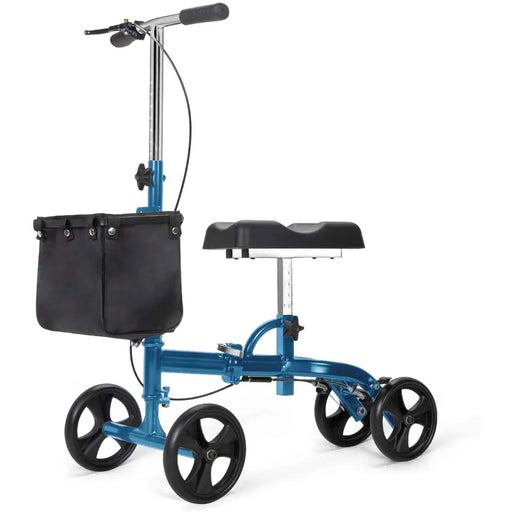
Economy A - 300 LBS Capacity Knee Scooter
From Original price $128.99Original priceFrom $128.99From $128.99Current price $128.99OasisSpace Economy Knee Walker OasisSpace Economy Knee walker is the most cost-effective knee scooter. Good-looking, full-featured, low price, fr...
View full detailsFrom Original price $128.99Original priceFrom $128.99From $128.99Current price $128.99 -
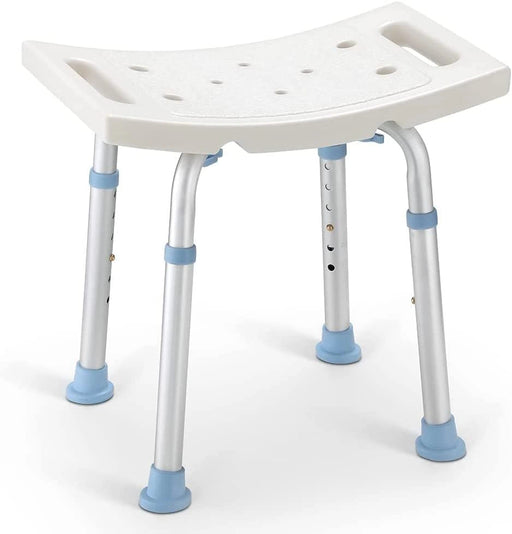 Sale
Sale
Standard - 300LBS Capacity Shower Stool
Original price $51.99From Original price $28.99Original price $51.99Current price $28.99From $28.99Current price $28.99OasisSpace Medical Square Shower Stool for Bathtub OasisSpace Square Shower Stool for Bathtub is approved as the highest standard(FDA) for medical...
View full detailsSaleOriginal price $51.99From Original price $28.99Original price $51.99Current price $28.99From $28.99Current price $28.99 -
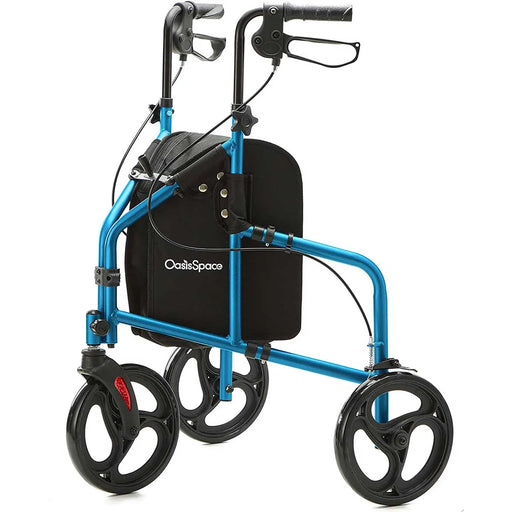
Flexible - 3 Wheels Rollator Walker
From Original price $79.99Original price$79.99From $79.99Current price $79.99OasisSpace Flexible 3 Wheel Rollator Walker for Seniors -Lightweight & Convenient OasisSpace Flexible 3 Wheel Rollator Walker adopts a triangu...
View full detailsFrom Original price $79.99Original price$79.99From $79.99Current price $79.99 -
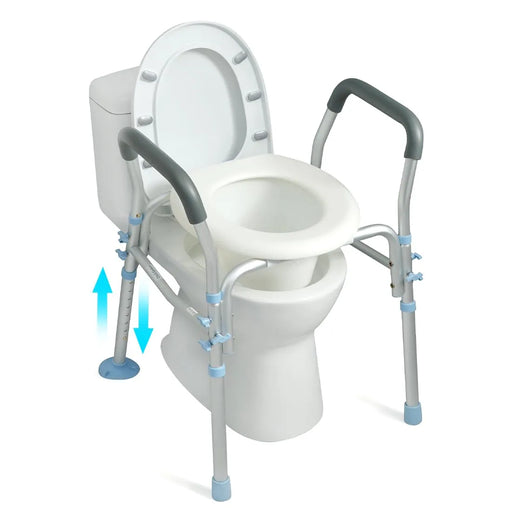 Sale
Sale
300LBS Capacity Raised Toilet Seat with Arms
Original price $120.99From Original price $69.99Original price $120.99Current price $69.99From $69.99Current price $69.99OasisSpace Raised Toilet Seat with Arms - Safe and Convenient OasisSpace Raised Toilet Seat with Arms provides stable support for users to sit dow...
View full detailsSaleOriginal price $120.99From Original price $69.99Original price $120.99Current price $69.99From $69.99Current price $69.99 -
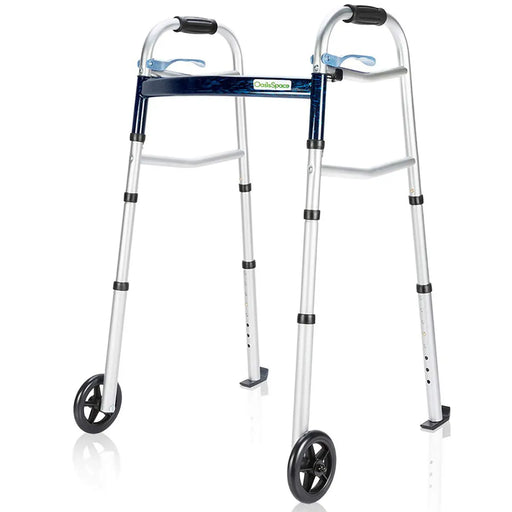
350LBS Capacity 2 Wheel Walker
From Original price $39.99Original price$39.99From $39.99Current price $39.99Product Advantages OasisSpace's 350LBS Capacity walker offers a fusion of lightweight design and sturdy support, crafted from high-grade anodized ...
View full detailsFrom Original price $39.99Original price$39.99From $39.99Current price $39.99 -
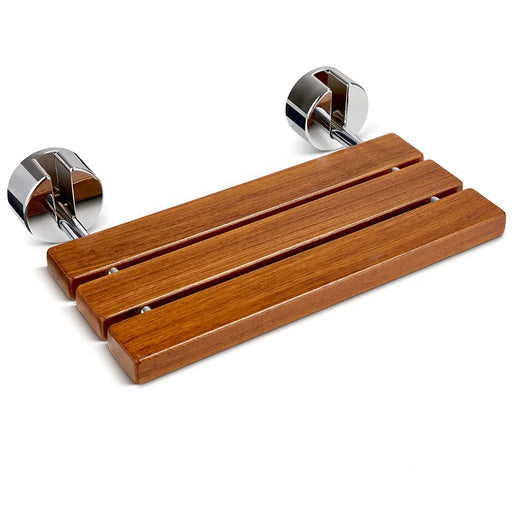
Wall Mounted - 400LBS Capacity Teak Folding Shower Seat
From Original price $131.99Original price$131.99From $131.99Current price $131.99Advantages OasisSpace Teak Wall-Mounted Shower Seat adopts a folding design, which can save space to the greatest extent and can be folded up at a...
View full detailsFrom Original price $131.99Original price$131.99From $131.99Current price $131.99 -
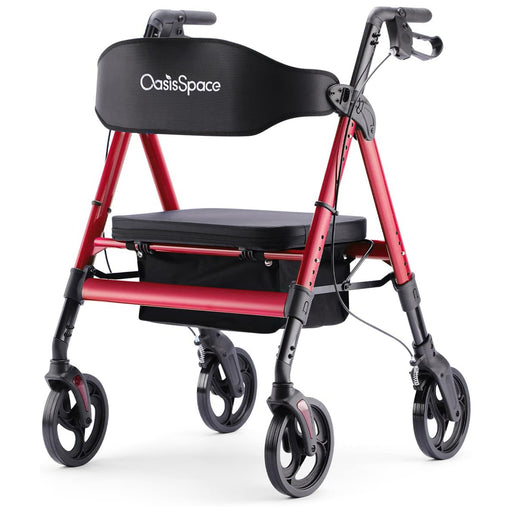 Sale
Sale
Heavy Duty - 450LBS Capacity Bariatric Rollator Walker
Original price $237.99From Original price $179.99Original price $237.99From $179.99From $179.99Current price $179.99OasisSpace Heavy Duty Rollator Walker- a Powerful Assistant for the Bariatric Elderly OasisSpace Heavy Duty Bariatric Rollator Walker with seat i...
View full detailsSaleOriginal price $237.99From Original price $179.99Original price $237.99From $179.99From $179.99Current price $179.99 -
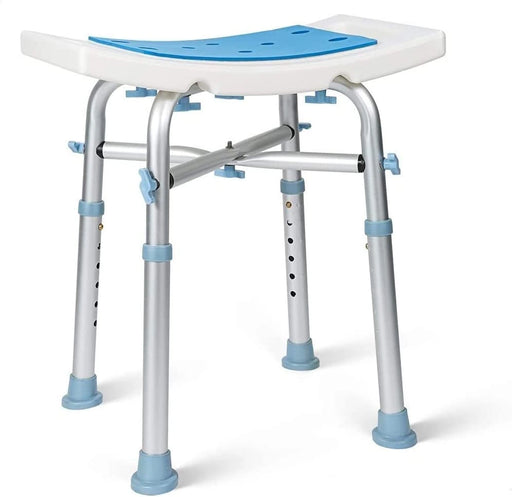 Sale
Sale
Padded & Bariatric - 500LBS Capacity Heavy Duty Shower Stool
Original price $57.99From Original price $36.99Original price $57.99Current price $36.99From $36.99Current price $36.99OasisSpace Medical Heavy Duty Bariatric Shower Stool OasisSpace Medical Heavy Duty Bariatric Shower Stool is approved by the FDA, which is the hig...
View full detailsSaleOriginal price $57.99From Original price $36.99Original price $57.99Current price $36.99From $36.99Current price $36.99 -
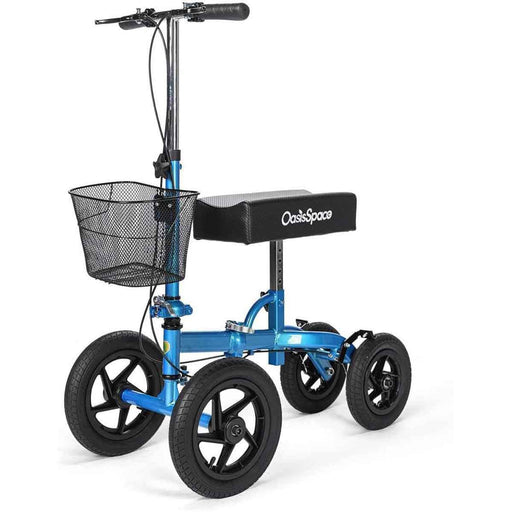 Sale
Sale
All-Terrain-300 LBS Capacity Knee Walker Scooter
Original price $239.99From Original price $189.99Original price $239.99Current price $189.99From $189.99Current price $189.99All-Terrain Knee Scooter Huge & All-Terrain Wheels The front all-terrain pneumatic wheels come with 12inch,which provide better stabilit...
View full detailsSaleOriginal price $239.99From Original price $189.99Original price $239.99Current price $189.99From $189.99Current price $189.99 -
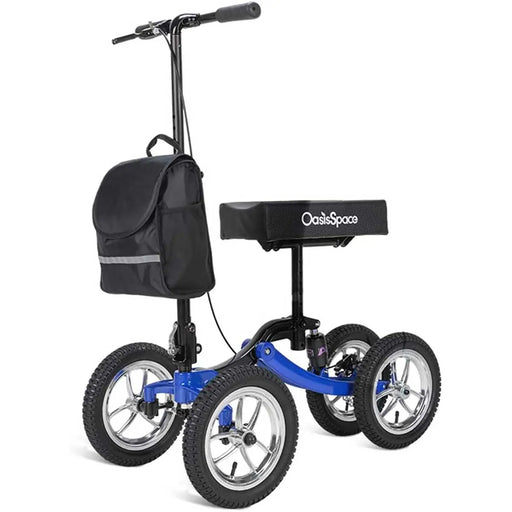 Sale
Sale
Explorer - 300 LBS Capacity Knee Scooter
Original price $300.99From Original price $289.99Original price $300.99Current price $289.99From $289.99Current price $289.99Product Main Advantages OasisSpace Explorer Off-road Knee Scooter is equipped with pneumatic tires, bearing 300lbs. With shock absorption, disc bra...
View full detailsSaleOriginal price $300.99From Original price $289.99Original price $300.99Current price $289.99From $289.99Current price $289.99











